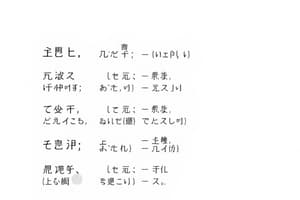Podcast
Questions and Answers
Which of the following sentences uses a word with the suffix '-less' correctly, based on its meaning 'without'?
Which of the following sentences uses a word with the suffix '-less' correctly, based on its meaning 'without'?
- His tireless efforts eventually led to success.
- The careless driver caused a major accident. (correct)
- She felt peerless after winning the championship.
- The boundless canyon stretched as far as the eye could see.
If '-er' can mean 'one who' or 'more,' which sentence correctly demonstrates the comparative use of the '-er' suffix?
If '-er' can mean 'one who' or 'more,' which sentence correctly demonstrates the comparative use of the '-er' suffix?
- My grandmother is a loving caregiver.
- The nights are getting colder. (correct)
- He works as a cashier at the grocery store.
- She is a skilled writer.
In which of the following words is the suffix '-ed' most likely indicating a characteristic or state of being, rather than a past action?
In which of the following words is the suffix '-ed' most likely indicating a characteristic or state of being, rather than a past action?
- She finished her assigned reading.
- They celebrated their achieved goals.
- He walked to the store.
- The painted canvas was beautiful. (correct)
Consider the rule about changing 'y' to 'i' before adding '-est.' Which of these words is correctly formed with the '-est' suffix?
Consider the rule about changing 'y' to 'i' before adding '-est.' Which of these words is correctly formed with the '-est' suffix?
Using your understanding of suffixes, determine which word below is formed incorrectly.
Using your understanding of suffixes, determine which word below is formed incorrectly.
Flashcards
What is a suffix?
What is a suffix?
A word part added to the end of a root word that changes the word's meaning.
Suffix '-er' meaning
Suffix '-er' meaning
Indicates 'one who' performs an action or signifies 'more' of something.
Suffix '-able' meaning
Suffix '-able' meaning
Means 'can be done'.
Suffix '-est' meaning
Suffix '-est' meaning
Signup and view all the flashcards
Suffixes '-ful', '-less', '-ed', '-ly' meaning
Suffixes '-ful', '-less', '-ed', '-ly' meaning
Signup and view all the flashcards
Study Notes
- Suffixes are word parts added to the end of a root word, changing the word's meaning.
Suffix '-er'
- '-er' signifies 'one who'.
- painter = one who paints
- preacher = one who preaches
- pitcher = one who pitches
- '-er' also indicates 'greater' or 'more'.
- closer = more close
- larger = more large
- shinier = more shiny
Suffix '-able'
- '-able' means 'can be done'.
- understandable = can be understood
- comparable = able to be compared
- excitable = can be excited
Suffix '-est'
- '-est' signifies 'the most'.
- scariest = the most scary
- happiest = the most happy
- longest = the most long
- When the root word ends in 'y', change the 'y' to 'i' before adding the '-est' suffix.
Common Suffixes
- -ful = full of (wonderful, thankful, colorful)
- -less = without (countless, careless, spotless)
- -ed = in the past (passed, groaned, kicked)
- -ly = having characteristics of (slowly, loudly, quickly)
Identifying Suffixes
- walked, quickly, and largest are words with suffixes in the sentence, "She walked quickly beside the largest dog she had ever seen."
- Suffixes can alter both the meaning and spelling of a word.
Studying That Suits You
Use AI to generate personalized quizzes and flashcards to suit your learning preferences.
Description
This lesson explores common suffixes like '-er,' '-able,' and '-est,' demonstrating how they alter word meanings. It covers suffixes such as '-ful,' '-less,' '-ed,' and '-ly,' explaining their functions in forming adjectives and adverbs. Learn to identify and understand how suffixes contribute to vocabulary and grammar.




